Personality Relates to Proactive Coping in University Students
VerifiedAdded on 2023/06/16
|11
|2854
|336
AI Summary
This article explores the relationship between personality and proactive coping in university students. The five-factor model of personality is discussed, as well as proactive and defensive coping strategies. The article also discusses stressors experienced by college students and effective stress management techniques.
Contribute Materials
Your contribution can guide someone’s learning journey. Share your
documents today.
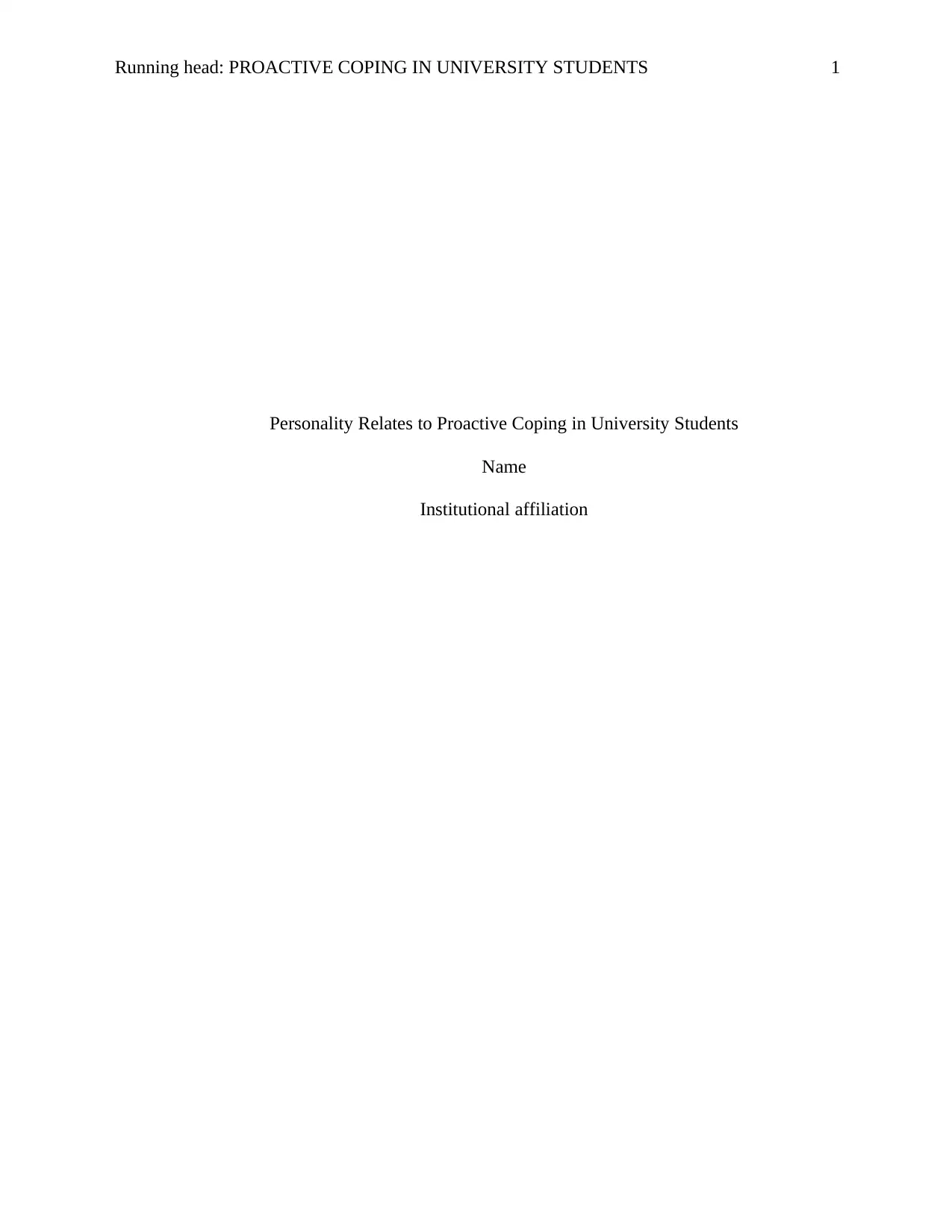
Running head: PROACTIVE COPING IN UNIVERSITY STUDENTS 1
Personality Relates to Proactive Coping in University Students
Name
Institutional affiliation
Personality Relates to Proactive Coping in University Students
Name
Institutional affiliation
Secure Best Marks with AI Grader
Need help grading? Try our AI Grader for instant feedback on your assignments.
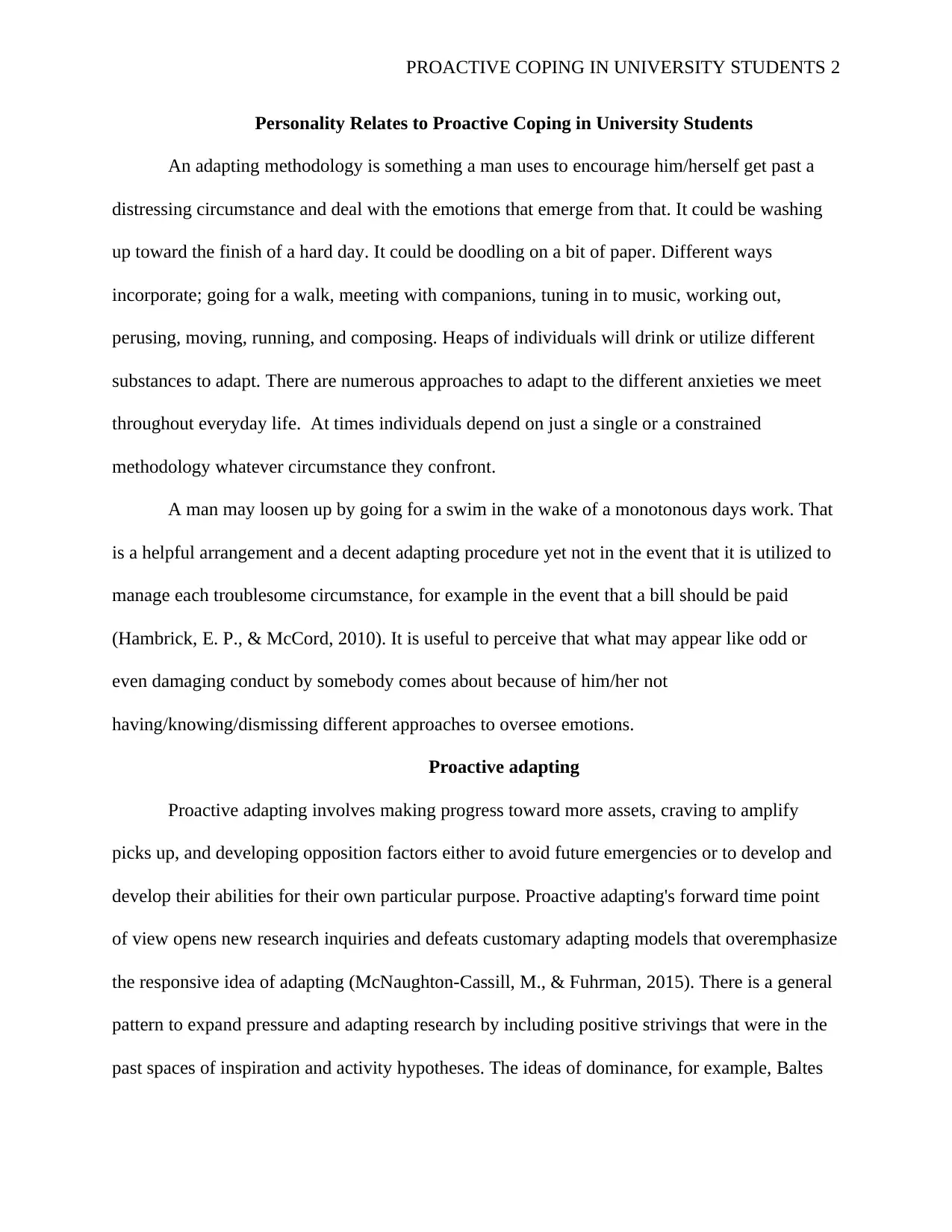
PROACTIVE COPING IN UNIVERSITY STUDENTS 2
Personality Relates to Proactive Coping in University Students
An adapting methodology is something a man uses to encourage him/herself get past a
distressing circumstance and deal with the emotions that emerge from that. It could be washing
up toward the finish of a hard day. It could be doodling on a bit of paper. Different ways
incorporate; going for a walk, meeting with companions, tuning in to music, working out,
perusing, moving, running, and composing. Heaps of individuals will drink or utilize different
substances to adapt. There are numerous approaches to adapt to the different anxieties we meet
throughout everyday life. At times individuals depend on just a single or a constrained
methodology whatever circumstance they confront.
A man may loosen up by going for a swim in the wake of a monotonous days work. That
is a helpful arrangement and a decent adapting procedure yet not in the event that it is utilized to
manage each troublesome circumstance, for example in the event that a bill should be paid
(Hambrick, E. P., & McCord, 2010). It is useful to perceive that what may appear like odd or
even damaging conduct by somebody comes about because of him/her not
having/knowing/dismissing different approaches to oversee emotions.
Proactive adapting
Proactive adapting involves making progress toward more assets, craving to amplify
picks up, and developing opposition factors either to avoid future emergencies or to develop and
develop their abilities for their own particular purpose. Proactive adapting's forward time point
of view opens new research inquiries and defeats customary adapting models that overemphasize
the responsive idea of adapting (McNaughton-Cassill, M., & Fuhrman, 2015). There is a general
pattern to expand pressure and adapting research by including positive strivings that were in the
past spaces of inspiration and activity hypotheses. The ideas of dominance, for example, Baltes
Personality Relates to Proactive Coping in University Students
An adapting methodology is something a man uses to encourage him/herself get past a
distressing circumstance and deal with the emotions that emerge from that. It could be washing
up toward the finish of a hard day. It could be doodling on a bit of paper. Different ways
incorporate; going for a walk, meeting with companions, tuning in to music, working out,
perusing, moving, running, and composing. Heaps of individuals will drink or utilize different
substances to adapt. There are numerous approaches to adapt to the different anxieties we meet
throughout everyday life. At times individuals depend on just a single or a constrained
methodology whatever circumstance they confront.
A man may loosen up by going for a swim in the wake of a monotonous days work. That
is a helpful arrangement and a decent adapting procedure yet not in the event that it is utilized to
manage each troublesome circumstance, for example in the event that a bill should be paid
(Hambrick, E. P., & McCord, 2010). It is useful to perceive that what may appear like odd or
even damaging conduct by somebody comes about because of him/her not
having/knowing/dismissing different approaches to oversee emotions.
Proactive adapting
Proactive adapting involves making progress toward more assets, craving to amplify
picks up, and developing opposition factors either to avoid future emergencies or to develop and
develop their abilities for their own particular purpose. Proactive adapting's forward time point
of view opens new research inquiries and defeats customary adapting models that overemphasize
the responsive idea of adapting (McNaughton-Cassill, M., & Fuhrman, 2015). There is a general
pattern to expand pressure and adapting research by including positive strivings that were in the
past spaces of inspiration and activity hypotheses. The ideas of dominance, for example, Baltes
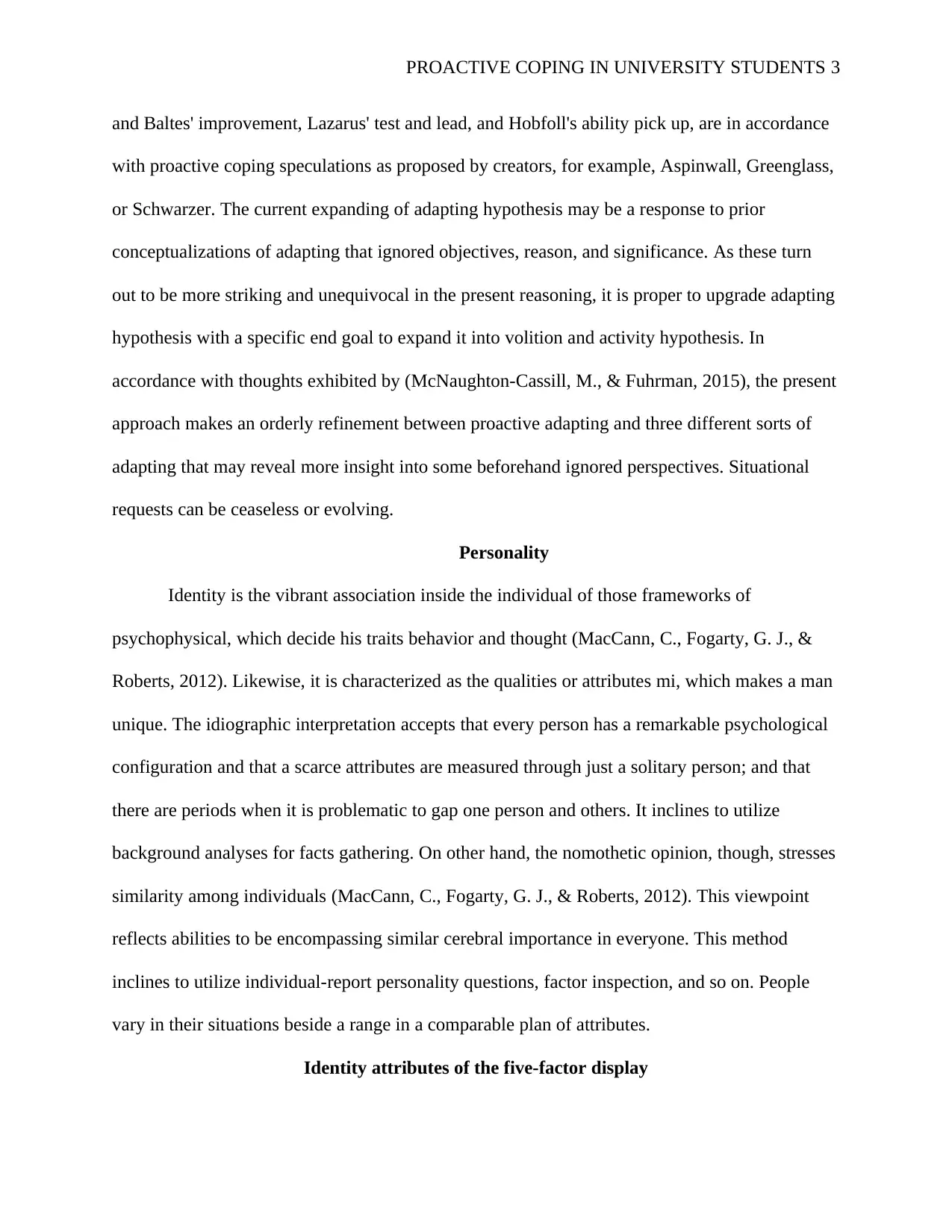
PROACTIVE COPING IN UNIVERSITY STUDENTS 3
and Baltes' improvement, Lazarus' test and lead, and Hobfoll's ability pick up, are in accordance
with proactive coping speculations as proposed by creators, for example, Aspinwall, Greenglass,
or Schwarzer. The current expanding of adapting hypothesis may be a response to prior
conceptualizations of adapting that ignored objectives, reason, and significance. As these turn
out to be more striking and unequivocal in the present reasoning, it is proper to upgrade adapting
hypothesis with a specific end goal to expand it into volition and activity hypothesis. In
accordance with thoughts exhibited by (McNaughton-Cassill, M., & Fuhrman, 2015), the present
approach makes an orderly refinement between proactive adapting and three different sorts of
adapting that may reveal more insight into some beforehand ignored perspectives. Situational
requests can be ceaseless or evolving.
Personality
Identity is the vibrant association inside the individual of those frameworks of
psychophysical, which decide his traits behavior and thought (MacCann, C., Fogarty, G. J., &
Roberts, 2012). Likewise, it is characterized as the qualities or attributes mi, which makes a man
unique. The idiographic interpretation accepts that every person has a remarkable psychological
configuration and that a scarce attributes are measured through just a solitary person; and that
there are periods when it is problematic to gap one person and others. It inclines to utilize
background analyses for facts gathering. On other hand, the nomothetic opinion, though, stresses
similarity among individuals (MacCann, C., Fogarty, G. J., & Roberts, 2012). This viewpoint
reflects abilities to be encompassing similar cerebral importance in everyone. This method
inclines to utilize individual-report personality questions, factor inspection, and so on. People
vary in their situations beside a range in a comparable plan of attributes.
Identity attributes of the five-factor display
and Baltes' improvement, Lazarus' test and lead, and Hobfoll's ability pick up, are in accordance
with proactive coping speculations as proposed by creators, for example, Aspinwall, Greenglass,
or Schwarzer. The current expanding of adapting hypothesis may be a response to prior
conceptualizations of adapting that ignored objectives, reason, and significance. As these turn
out to be more striking and unequivocal in the present reasoning, it is proper to upgrade adapting
hypothesis with a specific end goal to expand it into volition and activity hypothesis. In
accordance with thoughts exhibited by (McNaughton-Cassill, M., & Fuhrman, 2015), the present
approach makes an orderly refinement between proactive adapting and three different sorts of
adapting that may reveal more insight into some beforehand ignored perspectives. Situational
requests can be ceaseless or evolving.
Personality
Identity is the vibrant association inside the individual of those frameworks of
psychophysical, which decide his traits behavior and thought (MacCann, C., Fogarty, G. J., &
Roberts, 2012). Likewise, it is characterized as the qualities or attributes mi, which makes a man
unique. The idiographic interpretation accepts that every person has a remarkable psychological
configuration and that a scarce attributes are measured through just a solitary person; and that
there are periods when it is problematic to gap one person and others. It inclines to utilize
background analyses for facts gathering. On other hand, the nomothetic opinion, though, stresses
similarity among individuals (MacCann, C., Fogarty, G. J., & Roberts, 2012). This viewpoint
reflects abilities to be encompassing similar cerebral importance in everyone. This method
inclines to utilize individual-report personality questions, factor inspection, and so on. People
vary in their situations beside a range in a comparable plan of attributes.
Identity attributes of the five-factor display
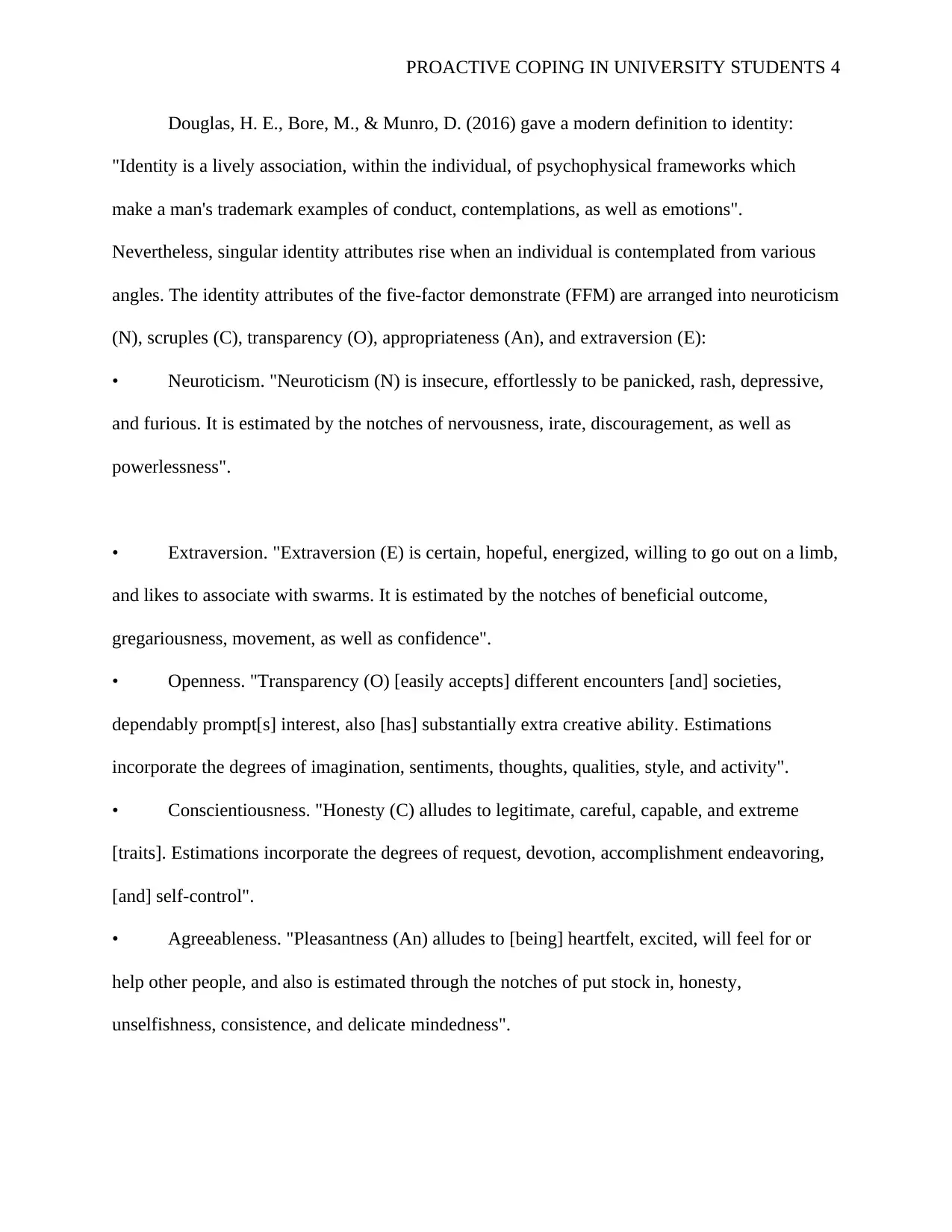
PROACTIVE COPING IN UNIVERSITY STUDENTS 4
Douglas, H. E., Bore, M., & Munro, D. (2016) gave a modern definition to identity:
"Identity is a lively association, within the individual, of psychophysical frameworks which
make a man's trademark examples of conduct, contemplations, as well as emotions".
Nevertheless, singular identity attributes rise when an individual is contemplated from various
angles. The identity attributes of the five-factor demonstrate (FFM) are arranged into neuroticism
(N), scruples (C), transparency (O), appropriateness (An), and extraversion (E):
• Neuroticism. "Neuroticism (N) is insecure, effortlessly to be panicked, rash, depressive,
and furious. It is estimated by the notches of nervousness, irate, discouragement, as well as
powerlessness".
• Extraversion. "Extraversion (E) is certain, hopeful, energized, willing to go out on a limb,
and likes to associate with swarms. It is estimated by the notches of beneficial outcome,
gregariousness, movement, as well as confidence".
• Openness. "Transparency (O) [easily accepts] different encounters [and] societies,
dependably prompt[s] interest, also [has] substantially extra creative ability. Estimations
incorporate the degrees of imagination, sentiments, thoughts, qualities, style, and activity".
• Conscientiousness. "Honesty (C) alludes to legitimate, careful, capable, and extreme
[traits]. Estimations incorporate the degrees of request, devotion, accomplishment endeavoring,
[and] self-control".
• Agreeableness. "Pleasantness (An) alludes to [being] heartfelt, excited, will feel for or
help other people, and also is estimated through the notches of put stock in, honesty,
unselfishness, consistence, and delicate mindedness".
Douglas, H. E., Bore, M., & Munro, D. (2016) gave a modern definition to identity:
"Identity is a lively association, within the individual, of psychophysical frameworks which
make a man's trademark examples of conduct, contemplations, as well as emotions".
Nevertheless, singular identity attributes rise when an individual is contemplated from various
angles. The identity attributes of the five-factor demonstrate (FFM) are arranged into neuroticism
(N), scruples (C), transparency (O), appropriateness (An), and extraversion (E):
• Neuroticism. "Neuroticism (N) is insecure, effortlessly to be panicked, rash, depressive,
and furious. It is estimated by the notches of nervousness, irate, discouragement, as well as
powerlessness".
• Extraversion. "Extraversion (E) is certain, hopeful, energized, willing to go out on a limb,
and likes to associate with swarms. It is estimated by the notches of beneficial outcome,
gregariousness, movement, as well as confidence".
• Openness. "Transparency (O) [easily accepts] different encounters [and] societies,
dependably prompt[s] interest, also [has] substantially extra creative ability. Estimations
incorporate the degrees of imagination, sentiments, thoughts, qualities, style, and activity".
• Conscientiousness. "Honesty (C) alludes to legitimate, careful, capable, and extreme
[traits]. Estimations incorporate the degrees of request, devotion, accomplishment endeavoring,
[and] self-control".
• Agreeableness. "Pleasantness (An) alludes to [being] heartfelt, excited, will feel for or
help other people, and also is estimated through the notches of put stock in, honesty,
unselfishness, consistence, and delicate mindedness".
Paraphrase This Document
Need a fresh take? Get an instant paraphrase of this document with our AI Paraphraser
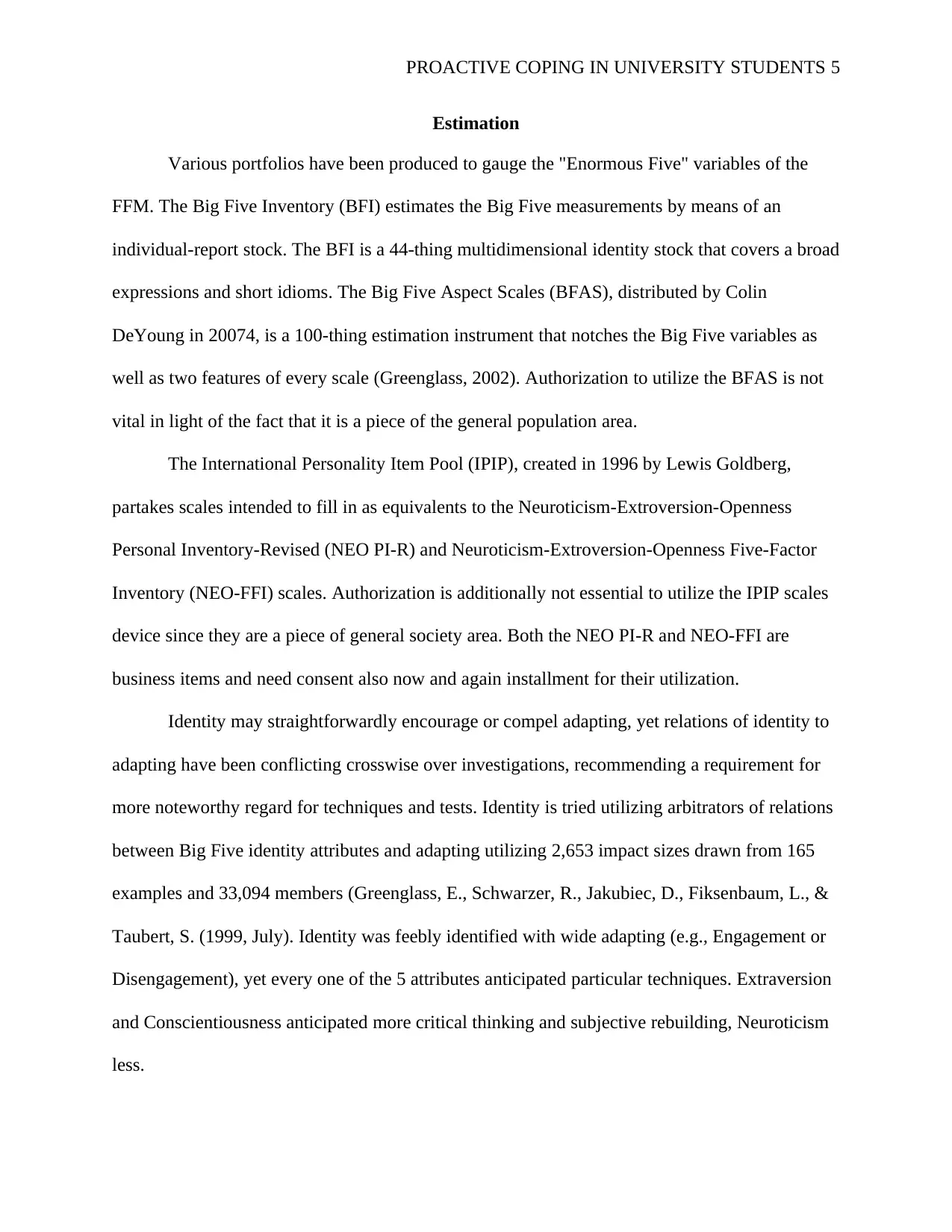
PROACTIVE COPING IN UNIVERSITY STUDENTS 5
Estimation
Various portfolios have been produced to gauge the "Enormous Five" variables of the
FFM. The Big Five Inventory (BFI) estimates the Big Five measurements by means of an
individual-report stock. The BFI is a 44-thing multidimensional identity stock that covers a broad
expressions and short idioms. The Big Five Aspect Scales (BFAS), distributed by Colin
DeYoung in 20074, is a 100-thing estimation instrument that notches the Big Five variables as
well as two features of every scale (Greenglass, 2002). Authorization to utilize the BFAS is not
vital in light of the fact that it is a piece of the general population area.
The International Personality Item Pool (IPIP), created in 1996 by Lewis Goldberg,
partakes scales intended to fill in as equivalents to the Neuroticism-Extroversion-Openness
Personal Inventory-Revised (NEO PI-R) and Neuroticism-Extroversion-Openness Five-Factor
Inventory (NEO-FFI) scales. Authorization is additionally not essential to utilize the IPIP scales
device since they are a piece of general society area. Both the NEO PI-R and NEO-FFI are
business items and need consent also now and again installment for their utilization.
Identity may straightforwardly encourage or compel adapting, yet relations of identity to
adapting have been conflicting crosswise over investigations, recommending a requirement for
more noteworthy regard for techniques and tests. Identity is tried utilizing arbitrators of relations
between Big Five identity attributes and adapting utilizing 2,653 impact sizes drawn from 165
examples and 33,094 members (Greenglass, E., Schwarzer, R., Jakubiec, D., Fiksenbaum, L., &
Taubert, S. (1999, July). Identity was feebly identified with wide adapting (e.g., Engagement or
Disengagement), yet every one of the 5 attributes anticipated particular techniques. Extraversion
and Conscientiousness anticipated more critical thinking and subjective rebuilding, Neuroticism
less.
Estimation
Various portfolios have been produced to gauge the "Enormous Five" variables of the
FFM. The Big Five Inventory (BFI) estimates the Big Five measurements by means of an
individual-report stock. The BFI is a 44-thing multidimensional identity stock that covers a broad
expressions and short idioms. The Big Five Aspect Scales (BFAS), distributed by Colin
DeYoung in 20074, is a 100-thing estimation instrument that notches the Big Five variables as
well as two features of every scale (Greenglass, 2002). Authorization to utilize the BFAS is not
vital in light of the fact that it is a piece of the general population area.
The International Personality Item Pool (IPIP), created in 1996 by Lewis Goldberg,
partakes scales intended to fill in as equivalents to the Neuroticism-Extroversion-Openness
Personal Inventory-Revised (NEO PI-R) and Neuroticism-Extroversion-Openness Five-Factor
Inventory (NEO-FFI) scales. Authorization is additionally not essential to utilize the IPIP scales
device since they are a piece of general society area. Both the NEO PI-R and NEO-FFI are
business items and need consent also now and again installment for their utilization.
Identity may straightforwardly encourage or compel adapting, yet relations of identity to
adapting have been conflicting crosswise over investigations, recommending a requirement for
more noteworthy regard for techniques and tests. Identity is tried utilizing arbitrators of relations
between Big Five identity attributes and adapting utilizing 2,653 impact sizes drawn from 165
examples and 33,094 members (Greenglass, E., Schwarzer, R., Jakubiec, D., Fiksenbaum, L., &
Taubert, S. (1999, July). Identity was feebly identified with wide adapting (e.g., Engagement or
Disengagement), yet every one of the 5 attributes anticipated particular techniques. Extraversion
and Conscientiousness anticipated more critical thinking and subjective rebuilding, Neuroticism
less.
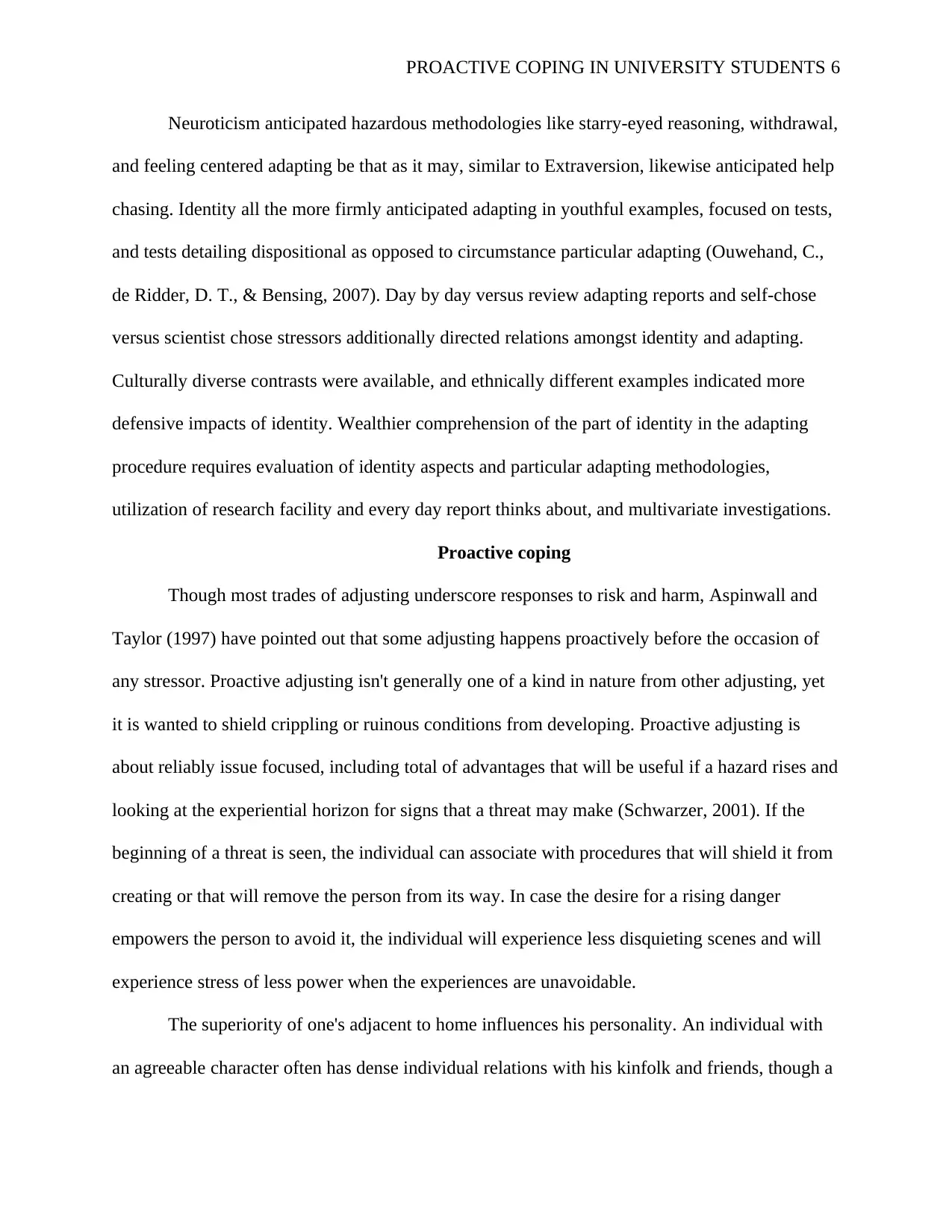
PROACTIVE COPING IN UNIVERSITY STUDENTS 6
Neuroticism anticipated hazardous methodologies like starry-eyed reasoning, withdrawal,
and feeling centered adapting be that as it may, similar to Extraversion, likewise anticipated help
chasing. Identity all the more firmly anticipated adapting in youthful examples, focused on tests,
and tests detailing dispositional as opposed to circumstance particular adapting (Ouwehand, C.,
de Ridder, D. T., & Bensing, 2007). Day by day versus review adapting reports and self-chose
versus scientist chose stressors additionally directed relations amongst identity and adapting.
Culturally diverse contrasts were available, and ethnically different examples indicated more
defensive impacts of identity. Wealthier comprehension of the part of identity in the adapting
procedure requires evaluation of identity aspects and particular adapting methodologies,
utilization of research facility and every day report thinks about, and multivariate investigations.
Proactive coping
Though most trades of adjusting underscore responses to risk and harm, Aspinwall and
Taylor (1997) have pointed out that some adjusting happens proactively before the occasion of
any stressor. Proactive adjusting isn't generally one of a kind in nature from other adjusting, yet
it is wanted to shield crippling or ruinous conditions from developing. Proactive adjusting is
about reliably issue focused, including total of advantages that will be useful if a hazard rises and
looking at the experiential horizon for signs that a threat may make (Schwarzer, 2001). If the
beginning of a threat is seen, the individual can associate with procedures that will shield it from
creating or that will remove the person from its way. In case the desire for a rising danger
empowers the person to avoid it, the individual will experience less disquieting scenes and will
experience stress of less power when the experiences are unavoidable.
The superiority of one's adjacent to home influences his personality. An individual with
an agreeable character often has dense individual relations with his kinfolk and friends, though a
Neuroticism anticipated hazardous methodologies like starry-eyed reasoning, withdrawal,
and feeling centered adapting be that as it may, similar to Extraversion, likewise anticipated help
chasing. Identity all the more firmly anticipated adapting in youthful examples, focused on tests,
and tests detailing dispositional as opposed to circumstance particular adapting (Ouwehand, C.,
de Ridder, D. T., & Bensing, 2007). Day by day versus review adapting reports and self-chose
versus scientist chose stressors additionally directed relations amongst identity and adapting.
Culturally diverse contrasts were available, and ethnically different examples indicated more
defensive impacts of identity. Wealthier comprehension of the part of identity in the adapting
procedure requires evaluation of identity aspects and particular adapting methodologies,
utilization of research facility and every day report thinks about, and multivariate investigations.
Proactive coping
Though most trades of adjusting underscore responses to risk and harm, Aspinwall and
Taylor (1997) have pointed out that some adjusting happens proactively before the occasion of
any stressor. Proactive adjusting isn't generally one of a kind in nature from other adjusting, yet
it is wanted to shield crippling or ruinous conditions from developing. Proactive adjusting is
about reliably issue focused, including total of advantages that will be useful if a hazard rises and
looking at the experiential horizon for signs that a threat may make (Schwarzer, 2001). If the
beginning of a threat is seen, the individual can associate with procedures that will shield it from
creating or that will remove the person from its way. In case the desire for a rising danger
empowers the person to avoid it, the individual will experience less disquieting scenes and will
experience stress of less power when the experiences are unavoidable.
The superiority of one's adjacent to home influences his personality. An individual with
an agreeable character often has dense individual relations with his kinfolk and friends, though a
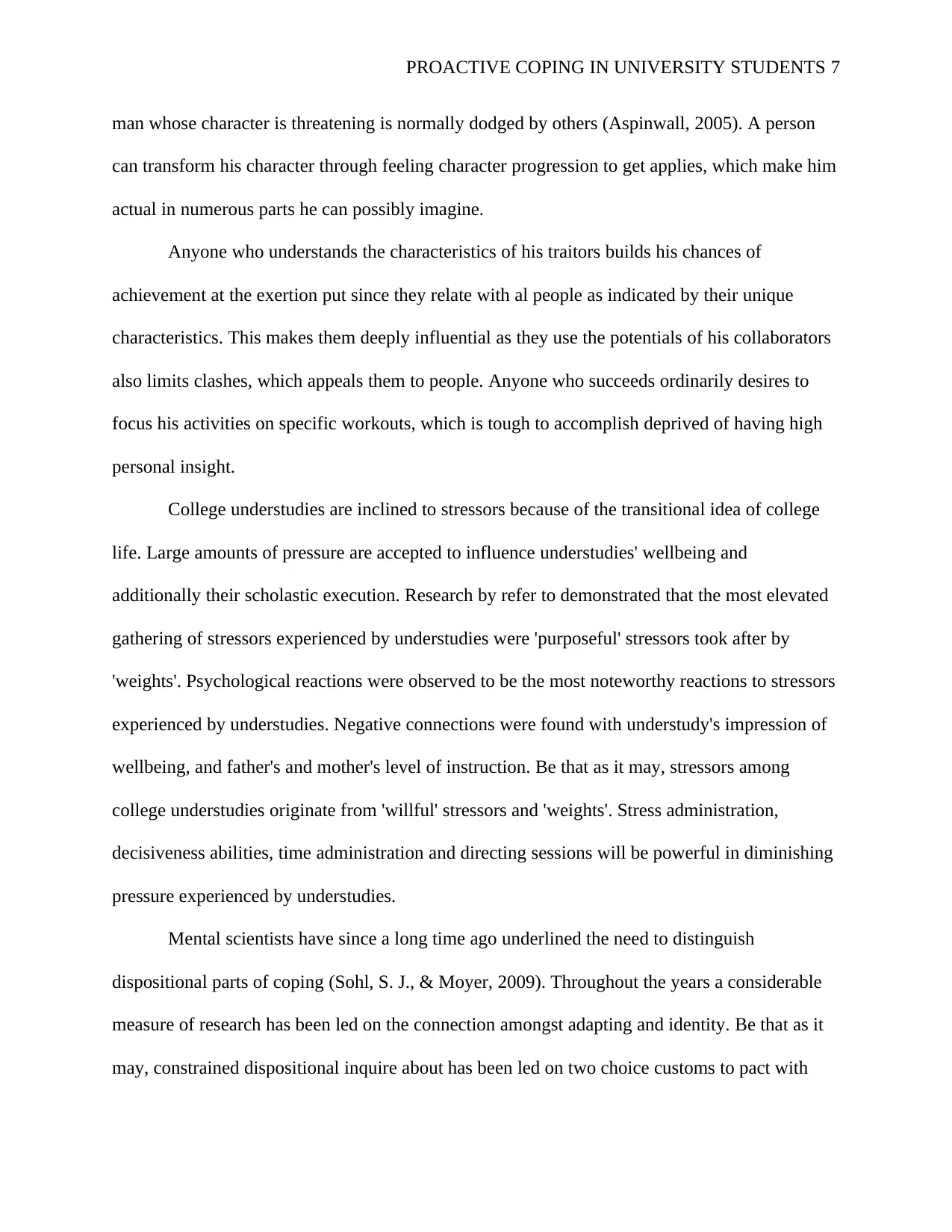
PROACTIVE COPING IN UNIVERSITY STUDENTS 7
man whose character is threatening is normally dodged by others (Aspinwall, 2005). A person
can transform his character through feeling character progression to get applies, which make him
actual in numerous parts he can possibly imagine.
Anyone who understands the characteristics of his traitors builds his chances of
achievement at the exertion put since they relate with al people as indicated by their unique
characteristics. This makes them deeply influential as they use the potentials of his collaborators
also limits clashes, which appeals them to people. Anyone who succeeds ordinarily desires to
focus his activities on specific workouts, which is tough to accomplish deprived of having high
personal insight.
College understudies are inclined to stressors because of the transitional idea of college
life. Large amounts of pressure are accepted to influence understudies' wellbeing and
additionally their scholastic execution. Research by refer to demonstrated that the most elevated
gathering of stressors experienced by understudies were 'purposeful' stressors took after by
'weights'. Psychological reactions were observed to be the most noteworthy reactions to stressors
experienced by understudies. Negative connections were found with understudy's impression of
wellbeing, and father's and mother's level of instruction. Be that as it may, stressors among
college understudies originate from 'willful' stressors and 'weights'. Stress administration,
decisiveness abilities, time administration and directing sessions will be powerful in diminishing
pressure experienced by understudies.
Mental scientists have since a long time ago underlined the need to distinguish
dispositional parts of coping (Sohl, S. J., & Moyer, 2009). Throughout the years a considerable
measure of research has been led on the connection amongst adapting and identity. Be that as it
may, constrained dispositional inquire about has been led on two choice customs to pact with
man whose character is threatening is normally dodged by others (Aspinwall, 2005). A person
can transform his character through feeling character progression to get applies, which make him
actual in numerous parts he can possibly imagine.
Anyone who understands the characteristics of his traitors builds his chances of
achievement at the exertion put since they relate with al people as indicated by their unique
characteristics. This makes them deeply influential as they use the potentials of his collaborators
also limits clashes, which appeals them to people. Anyone who succeeds ordinarily desires to
focus his activities on specific workouts, which is tough to accomplish deprived of having high
personal insight.
College understudies are inclined to stressors because of the transitional idea of college
life. Large amounts of pressure are accepted to influence understudies' wellbeing and
additionally their scholastic execution. Research by refer to demonstrated that the most elevated
gathering of stressors experienced by understudies were 'purposeful' stressors took after by
'weights'. Psychological reactions were observed to be the most noteworthy reactions to stressors
experienced by understudies. Negative connections were found with understudy's impression of
wellbeing, and father's and mother's level of instruction. Be that as it may, stressors among
college understudies originate from 'willful' stressors and 'weights'. Stress administration,
decisiveness abilities, time administration and directing sessions will be powerful in diminishing
pressure experienced by understudies.
Mental scientists have since a long time ago underlined the need to distinguish
dispositional parts of coping (Sohl, S. J., & Moyer, 2009). Throughout the years a considerable
measure of research has been led on the connection amongst adapting and identity. Be that as it
may, constrained dispositional inquire about has been led on two choice customs to pact with
Secure Best Marks with AI Grader
Need help grading? Try our AI Grader for instant feedback on your assignments.
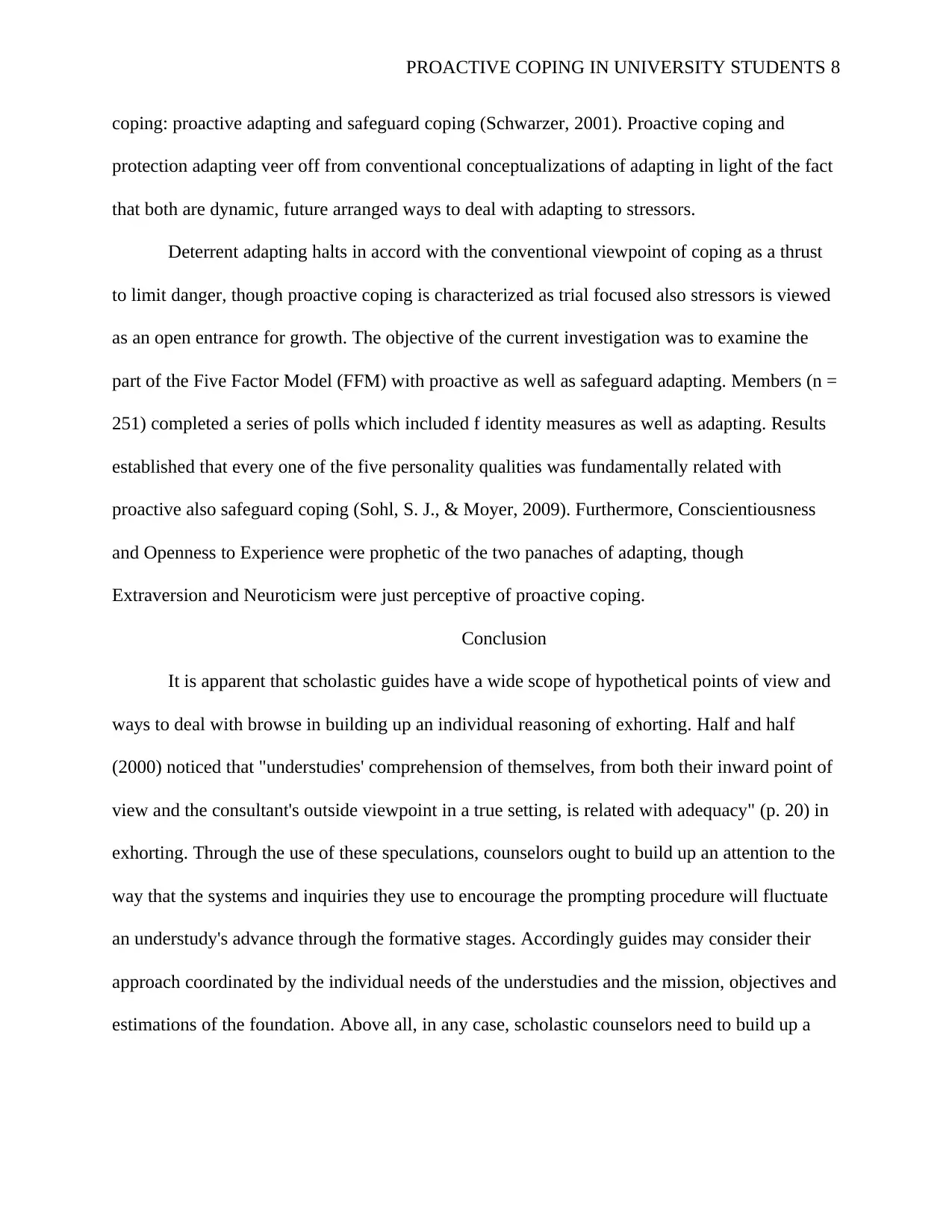
PROACTIVE COPING IN UNIVERSITY STUDENTS 8
coping: proactive adapting and safeguard coping (Schwarzer, 2001). Proactive coping and
protection adapting veer off from conventional conceptualizations of adapting in light of the fact
that both are dynamic, future arranged ways to deal with adapting to stressors.
Deterrent adapting halts in accord with the conventional viewpoint of coping as a thrust
to limit danger, though proactive coping is characterized as trial focused also stressors is viewed
as an open entrance for growth. The objective of the current investigation was to examine the
part of the Five Factor Model (FFM) with proactive as well as safeguard adapting. Members (n =
251) completed a series of polls which included f identity measures as well as adapting. Results
established that every one of the five personality qualities was fundamentally related with
proactive also safeguard coping (Sohl, S. J., & Moyer, 2009). Furthermore, Conscientiousness
and Openness to Experience were prophetic of the two panaches of adapting, though
Extraversion and Neuroticism were just perceptive of proactive coping.
Conclusion
It is apparent that scholastic guides have a wide scope of hypothetical points of view and
ways to deal with browse in building up an individual reasoning of exhorting. Half and half
(2000) noticed that "understudies' comprehension of themselves, from both their inward point of
view and the consultant's outside viewpoint in a true setting, is related with adequacy" (p. 20) in
exhorting. Through the use of these speculations, counselors ought to build up an attention to the
way that the systems and inquiries they use to encourage the prompting procedure will fluctuate
an understudy's advance through the formative stages. Accordingly guides may consider their
approach coordinated by the individual needs of the understudies and the mission, objectives and
estimations of the foundation. Above all, in any case, scholastic counselors need to build up a
coping: proactive adapting and safeguard coping (Schwarzer, 2001). Proactive coping and
protection adapting veer off from conventional conceptualizations of adapting in light of the fact
that both are dynamic, future arranged ways to deal with adapting to stressors.
Deterrent adapting halts in accord with the conventional viewpoint of coping as a thrust
to limit danger, though proactive coping is characterized as trial focused also stressors is viewed
as an open entrance for growth. The objective of the current investigation was to examine the
part of the Five Factor Model (FFM) with proactive as well as safeguard adapting. Members (n =
251) completed a series of polls which included f identity measures as well as adapting. Results
established that every one of the five personality qualities was fundamentally related with
proactive also safeguard coping (Sohl, S. J., & Moyer, 2009). Furthermore, Conscientiousness
and Openness to Experience were prophetic of the two panaches of adapting, though
Extraversion and Neuroticism were just perceptive of proactive coping.
Conclusion
It is apparent that scholastic guides have a wide scope of hypothetical points of view and
ways to deal with browse in building up an individual reasoning of exhorting. Half and half
(2000) noticed that "understudies' comprehension of themselves, from both their inward point of
view and the consultant's outside viewpoint in a true setting, is related with adequacy" (p. 20) in
exhorting. Through the use of these speculations, counselors ought to build up an attention to the
way that the systems and inquiries they use to encourage the prompting procedure will fluctuate
an understudy's advance through the formative stages. Accordingly guides may consider their
approach coordinated by the individual needs of the understudies and the mission, objectives and
estimations of the foundation. Above all, in any case, scholastic counselors need to build up a
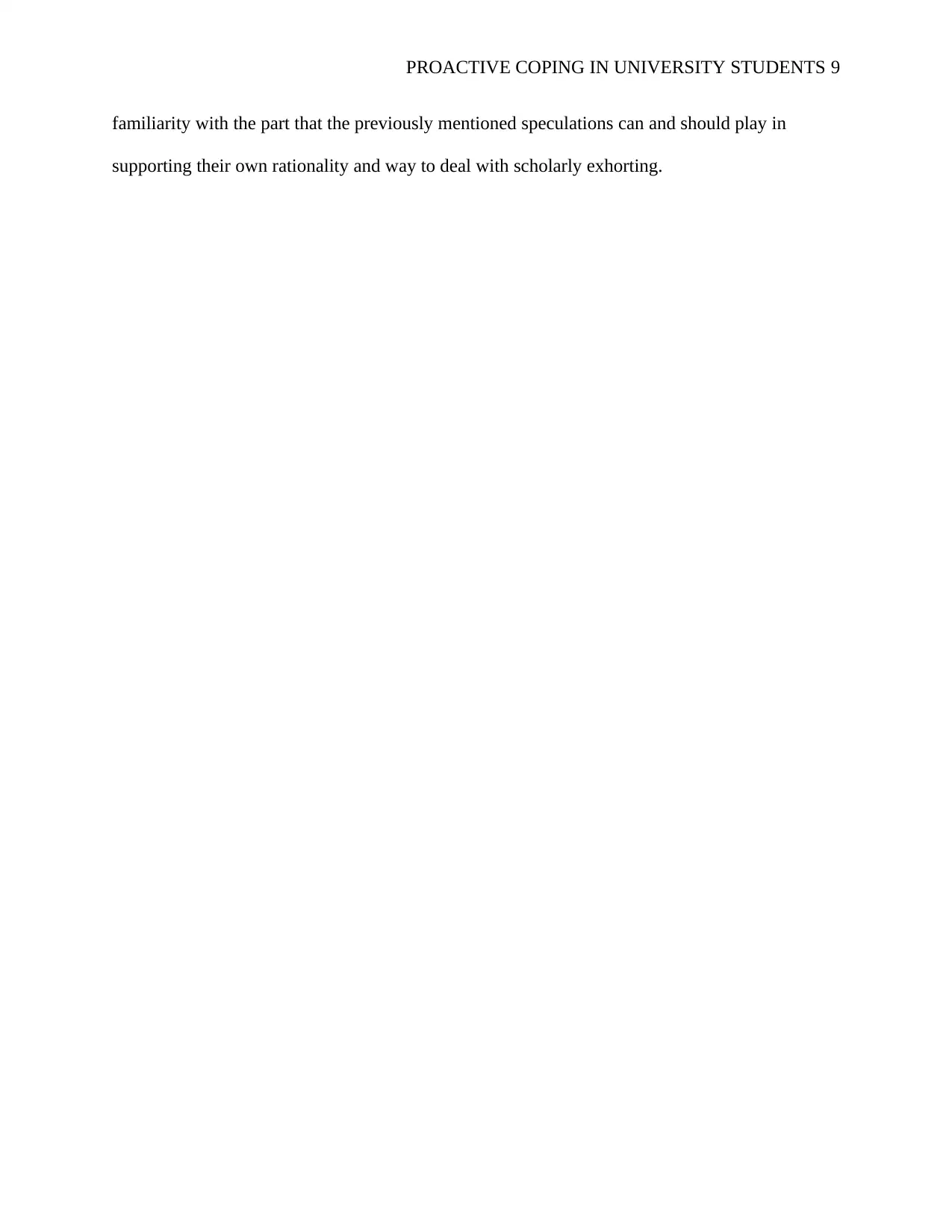
PROACTIVE COPING IN UNIVERSITY STUDENTS 9
familiarity with the part that the previously mentioned speculations can and should play in
supporting their own rationality and way to deal with scholarly exhorting.
familiarity with the part that the previously mentioned speculations can and should play in
supporting their own rationality and way to deal with scholarly exhorting.
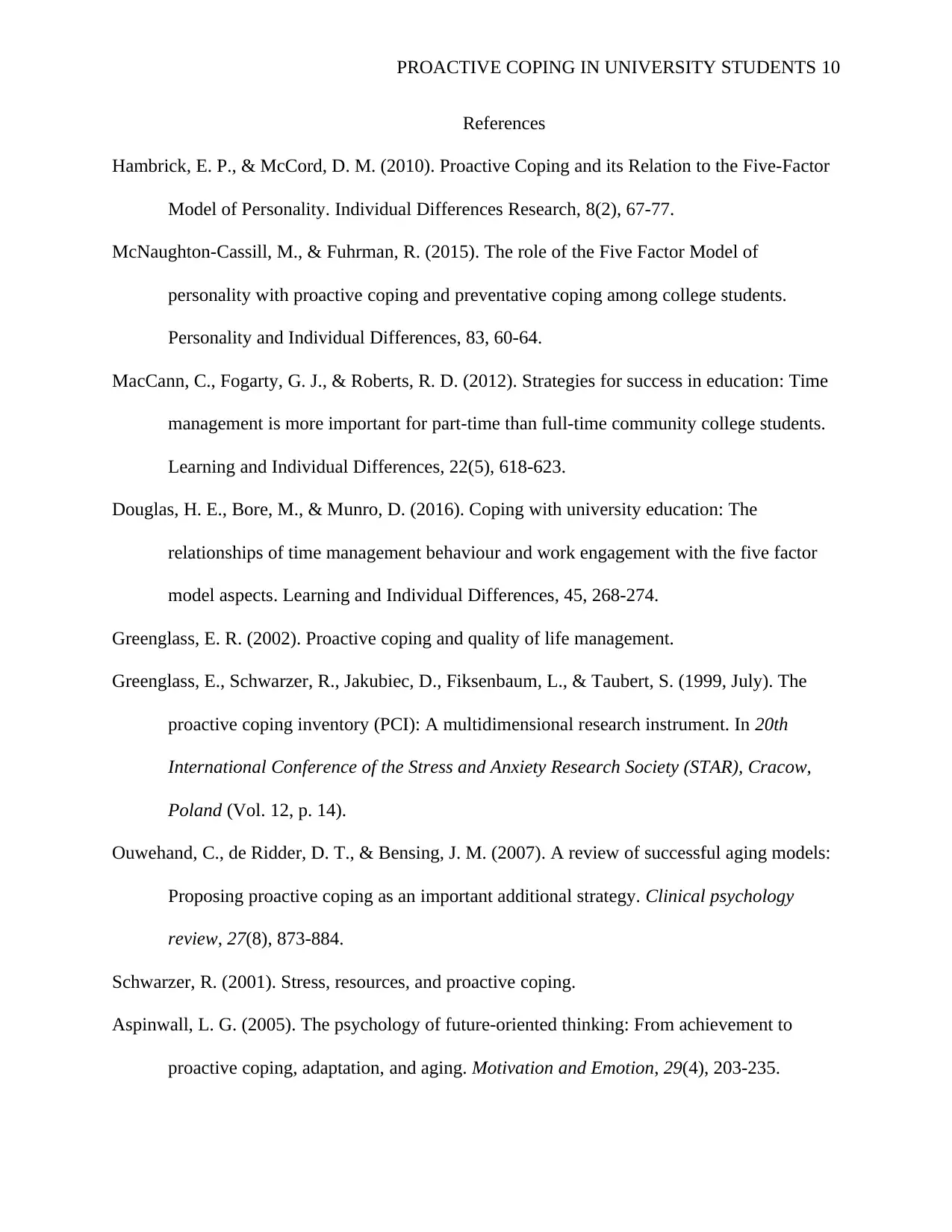
PROACTIVE COPING IN UNIVERSITY STUDENTS 10
References
Hambrick, E. P., & McCord, D. M. (2010). Proactive Coping and its Relation to the Five-Factor
Model of Personality. Individual Differences Research, 8(2), 67-77.
McNaughton-Cassill, M., & Fuhrman, R. (2015). The role of the Five Factor Model of
personality with proactive coping and preventative coping among college students.
Personality and Individual Differences, 83, 60-64.
MacCann, C., Fogarty, G. J., & Roberts, R. D. (2012). Strategies for success in education: Time
management is more important for part-time than full-time community college students.
Learning and Individual Differences, 22(5), 618-623.
Douglas, H. E., Bore, M., & Munro, D. (2016). Coping with university education: The
relationships of time management behaviour and work engagement with the five factor
model aspects. Learning and Individual Differences, 45, 268-274.
Greenglass, E. R. (2002). Proactive coping and quality of life management.
Greenglass, E., Schwarzer, R., Jakubiec, D., Fiksenbaum, L., & Taubert, S. (1999, July). The
proactive coping inventory (PCI): A multidimensional research instrument. In 20th
International Conference of the Stress and Anxiety Research Society (STAR), Cracow,
Poland (Vol. 12, p. 14).
Ouwehand, C., de Ridder, D. T., & Bensing, J. M. (2007). A review of successful aging models:
Proposing proactive coping as an important additional strategy. Clinical psychology
review, 27(8), 873-884.
Schwarzer, R. (2001). Stress, resources, and proactive coping.
Aspinwall, L. G. (2005). The psychology of future-oriented thinking: From achievement to
proactive coping, adaptation, and aging. Motivation and Emotion, 29(4), 203-235.
References
Hambrick, E. P., & McCord, D. M. (2010). Proactive Coping and its Relation to the Five-Factor
Model of Personality. Individual Differences Research, 8(2), 67-77.
McNaughton-Cassill, M., & Fuhrman, R. (2015). The role of the Five Factor Model of
personality with proactive coping and preventative coping among college students.
Personality and Individual Differences, 83, 60-64.
MacCann, C., Fogarty, G. J., & Roberts, R. D. (2012). Strategies for success in education: Time
management is more important for part-time than full-time community college students.
Learning and Individual Differences, 22(5), 618-623.
Douglas, H. E., Bore, M., & Munro, D. (2016). Coping with university education: The
relationships of time management behaviour and work engagement with the five factor
model aspects. Learning and Individual Differences, 45, 268-274.
Greenglass, E. R. (2002). Proactive coping and quality of life management.
Greenglass, E., Schwarzer, R., Jakubiec, D., Fiksenbaum, L., & Taubert, S. (1999, July). The
proactive coping inventory (PCI): A multidimensional research instrument. In 20th
International Conference of the Stress and Anxiety Research Society (STAR), Cracow,
Poland (Vol. 12, p. 14).
Ouwehand, C., de Ridder, D. T., & Bensing, J. M. (2007). A review of successful aging models:
Proposing proactive coping as an important additional strategy. Clinical psychology
review, 27(8), 873-884.
Schwarzer, R. (2001). Stress, resources, and proactive coping.
Aspinwall, L. G. (2005). The psychology of future-oriented thinking: From achievement to
proactive coping, adaptation, and aging. Motivation and Emotion, 29(4), 203-235.
Paraphrase This Document
Need a fresh take? Get an instant paraphrase of this document with our AI Paraphraser
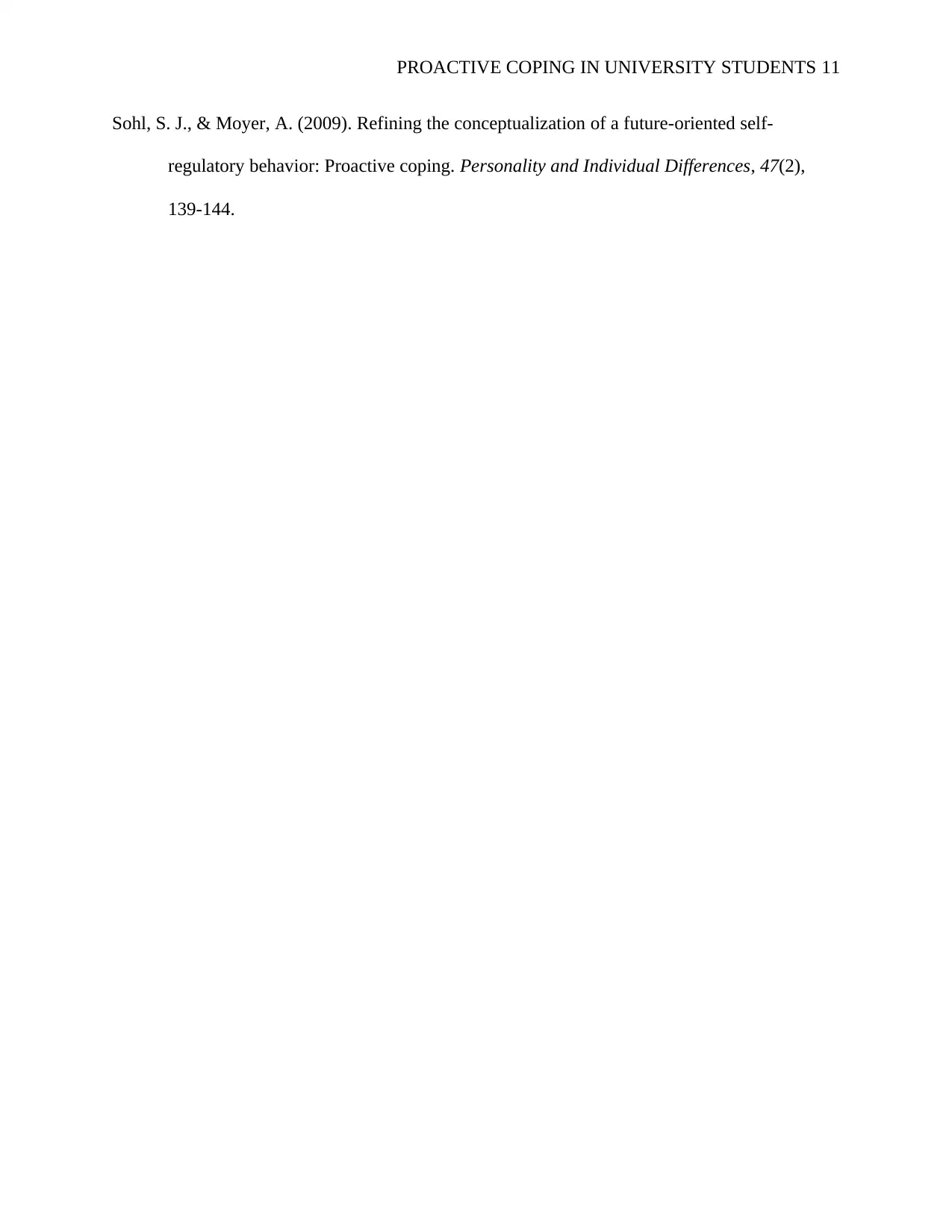
PROACTIVE COPING IN UNIVERSITY STUDENTS 11
Sohl, S. J., & Moyer, A. (2009). Refining the conceptualization of a future-oriented self-
regulatory behavior: Proactive coping. Personality and Individual Differences, 47(2),
139-144.
Sohl, S. J., & Moyer, A. (2009). Refining the conceptualization of a future-oriented self-
regulatory behavior: Proactive coping. Personality and Individual Differences, 47(2),
139-144.
1 out of 11
Related Documents
Your All-in-One AI-Powered Toolkit for Academic Success.
+13062052269
info@desklib.com
Available 24*7 on WhatsApp / Email
![[object Object]](/_next/static/media/star-bottom.7253800d.svg)
Unlock your academic potential
© 2024 | Zucol Services PVT LTD | All rights reserved.
